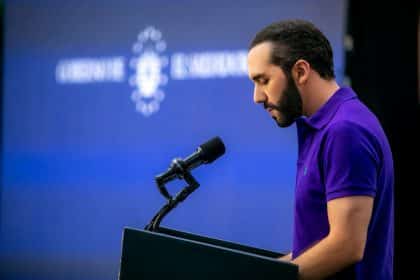The El Salvador Bitcoin experiment has so far proven to be more of a miss as the nation weathers several fiscal constraints.
Since it embarked on its Bitcoin (BTC) experiment a year ago, El Salvador reportedly has little to show for it. The Central American nation adopted the leading crypto as a legal tender on September 7th, 2021, becoming the first country in the world to do so. However, it has weathered more economic disadvantages than added benefits so far. For instance, BTC usage in El Salvador appears to be low amid broader market volatility. Furthermore, in addition to declining economic growth, the country has lost around $60 million to Bitcoin’s plummeting value. In addition, El Salvador has also reportedly spent approximately $375 million to create an enabling structure for its Bitcoin experiment.
According to Edgardo Acevedo, a development engineer working in El Salvador, the country’s crypto experiment has contributed little beyond global popularity. As he put it:
“I don’t think anything has changed, except that the country is more recognized than before, but the economic life of Salvadorans remains the same or worse than a few years ago.”
Furthermore, the development engineer based in the capital city of San Salvador touched on BTC’s low adoption rate. In Acevedo’s opinion, despite Bitcoin being a focal point of discussions, few businesses in El Salvador accept the crypto. In addition, an even smaller number of Salvadorans are willing to pay for goods and services using the prominent coin.
Observers Suggest El Salvador Bitcoin Experiment Was Dead on Arrival
Laura Andrade, director of El Salvador’s Universidad Centroamericana, opines that Bitcoin never stood a chance of penetrating Salvadoran national commerce. Ziemba Insights founder Rachel Ziemba also weighed in on the El Salvador situation. According to her, Salvadorans initially used BTC on a one-time basis to reap the accompanying rewards. As Ziemba explained:
“There seems to be evidence that most people used it primarily to get the free money from the government but have not used it on an ongoing basis given volatility and fees.”
El Salvador Grapples with Numerous Fiscal Constraints Amid Plummeting BTC Value
El Salvador’s Bitcoin experiment has failed to live up to the grand promises touted by President Nayib Bukele over a year ago. It also does not help that the leading crypto has lost nearly 60% of its value since the project began. Amid this, El Salvador’s debt-to-GDP ratio is almost at 87% this year. This directly means that the country may be in danger of defaulting on loan obligations. In fact, Bloomberg Economics puts the Central American nation at the top of its list of emerging markets risking a debt default.
El Salvador has faced repeated credit rating reductions and is retiring some of its outstanding debts. In late September, the country announced that it would spend the maximum allowable $360 million to repurchase $565 million bonds outstanding. In addition, Bukele also announced that El Salvador would buy back the amounts outstanding after the operation. However, the nation’s domestic and multilateral loan obligations present a credible challenge despite these measures. This is partly because El Salvador is betting its future on Bitcoin – a highly volatile asset.
next